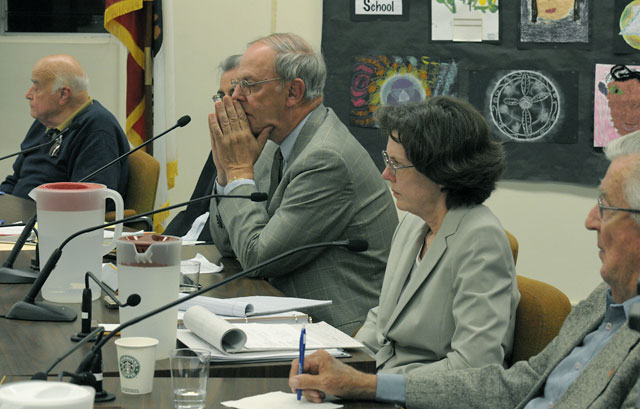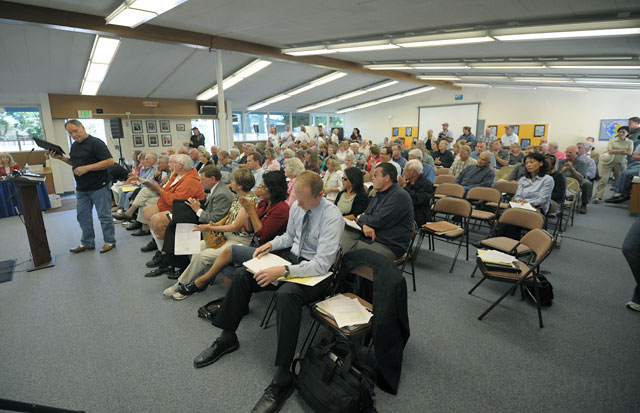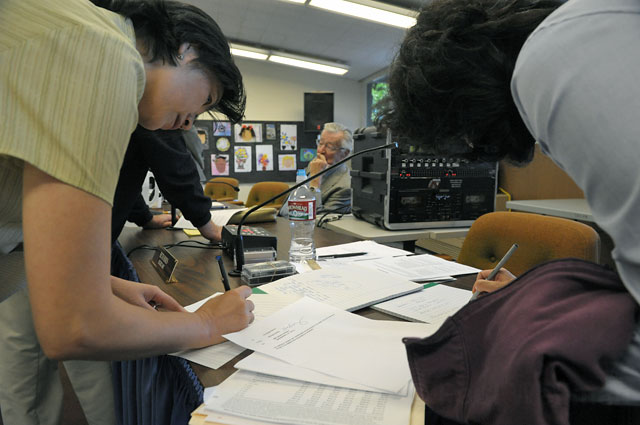Goleta Water District Jacks Up Rates
Customers Say They Are Getting Hosed

Nothing fosters civic engagement quite like a 43 percent rate hike in water fees, which the Goleta Water District (GWD) directors approved Wednesday night by a 4-1 vote. Although the measure passed, well over 100 Goletans and Noletans packed the boardroom at the Goleta Union School District offices to voice their dissent.
The net rate hike will be implemented in stages over five years with the biggest jump — 16 percent — coming in the first year effective July 1. The subsequent fee increases over the next four years will be 11, 7, 3 and one percent, respectively.
Twenty-nine rate-payers spoke in protest of the fee increases during public comment. All of them were followed by applause. They complained as much about the callousness of the steep hikes as they did about their implementation.

According to California Proposition 218, the water district must notify all rate payers about any rate changes by mail and hold a public hearing within 45 days. In turn, rate payers have the opportunity to protest. If more than 50 percent of a district’s users file protests in writing, the rate cannot be changed.
Many of the citizens at last night’s meeting argued that notices should have been sent not to bill-payers but to parcel owners. They worried that renters have less incentive to protest water rates. The lone dissenting vote on the board, Bert Bertrando, agreed that as a clarification of Proposition 13, Proposition 218 is aimed specifically at property owners.
Attorney Susan Petrovich argued that the language in Prop. 218 stipulates that notices must go to parcel owners. Because they did not, she said, GWD has no authority to count protests and therefore any subsequent rate hikes would be illegal. “You must re-notice,” she said, and warned of possible legal action. (GWD’s legal consultants disagreed with her analysis.)
Petrovich represents agricultural land owners who would be hardest hit by the rate increases. Their bills can run into the tens of thousands of dollars. Angela Rockwell, who grows avocados, said the increase means that water fees will eat up 20 percent of her income.
Dos Pueblos teacher John Dent said that the fee increase is “driving families like ours outside of the community.” He also said rate payers should have been able to protest over email or on the Internet. Because protests must include a signature, they can only be mailed or faxed.

Despite such complaints, protest letters were tallied during a long recess in the middle of last night’s meeting. District staff counted 1,105 protests, an impressive number but far short of half the 14,448 parcels that make up the GWD.
After the count, directors and staff had a chance to justify their actions to the community. They pushed back against theories that overstaffing, exorbitant administrative salaries, or the workers’ union (SEIU 620) were behind the fee increases. Board president Bill Rosen said that the current board and administration were left holding the bag after years of prior mismanagement in many areas. He said that the GWD has hired a professional negotiator to deal with the union and has recently changed its budgeting, accounting, and investment practices.
The district, however, has zero cash reserves and is on the brink of insolvency. If current water rates remain the same, said Grant Hogue—a financial consultant with Camp Dresser McKee—GWD will begin hemorrhaging a third of a million dollars monthly by next year.
While pipes and mains are deteriorating, reduced water consumption due to the down economy (and more recently to rainfall) have put the squeeze on water districts statewide. Other districts, however, have done a better job at adjusting their rates accordingly. GWD has not raised its rates since 2007.
A 16 percent increase in one year is a hard pill for many Goleta customers to swallow, and they aren’t sure if they can afford the glass of water to help it down. A number of commenters last night suggested that rate increases should be commensurate with cost-of-living increases. “These are very hard times,” said Michael Hartley. “Many people can’t take another hit.”



